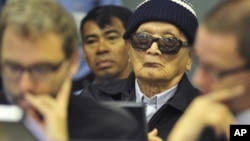PHNOM PENH & WASHINGTON DC - Jailed Khmer Rouge leader Nuon Chea does not have health problems that would prevent him from continuing an atrocity crimes trial, experts told the UN-backed tribunal Monday. In a hearing less than a week after the death of another former leader, Ieng Sary, experts said the trial against Nuon Chea should continue.
Health experts interviewed Nuon Chea, 86, for more than two hours and found he was able to maintain the concentration necessary for him to take part in a trial.
“We found that he would be able to concentrate over a court session and be able to participate meaningfully on the basis of his concentration and his memory,” Seena Fazel, a British expert who examined Nuon Chea, told the court. Nuon Chea has no problems with short-term or long-term memory, Fazel said.
Medical expert Joseph Campbell told the court Nuon Chea should be brought into the court 30 minutes prior to any hearing and should be allowed exercises to regain his strength while in detention.
Noun Chea, the Khmer Rouge’s chief ideologue, is on trial for atrocity crimes, including genocide, alongside Khieu Samphan, the regime’s head of state. They are the only two currently in custody and on trial, following the guilty verdict in the first case, against torture chief Duch, and the release of former social affairs minister Ieng Thirith, who was found mentally unfit to stand trial last year.
Defense attorneys disagreed with the findings of the experts and requested that the court ensure that Nuon Chea be given a clean bill of health before a trial continues. The Trial Chamber of the court will decide on Nuon Chea’s health and ability to continue a trial on Friday.
Observers at the court worry that it has taken too long to complete trials at the court, which began its work in 2006.
“It remains doubtful that the [court] will successfully complete its current caseload and make a positive contribution to ending impunity and increasing respect for the rule of law in Cambodia,” the US-based Open Society Justice Initiative said in a report issued earlier this month.
The tribunal is facing severe under-funding, and two more cases that would require five more indictments have been slow to move through the system.
OSJI said the court has two main problems. The first is political interference from Cambodian officials who do not want more trials to continue. The second is the old age of the defendants currently on trial.
The solution to the first problem is in the hands of the Cambodian government, which must “publicly remedy the existence and appearance of political interference in judicial decisions,” OSJI said. The solution to the second problem is for the court to move with “urgency,” the group said.
Nuon Chea Cleared for Trial as Doubt Hangs Over Tribunal
- Kong Sothanarith
- Sok Khemara
- VOA Khmer







